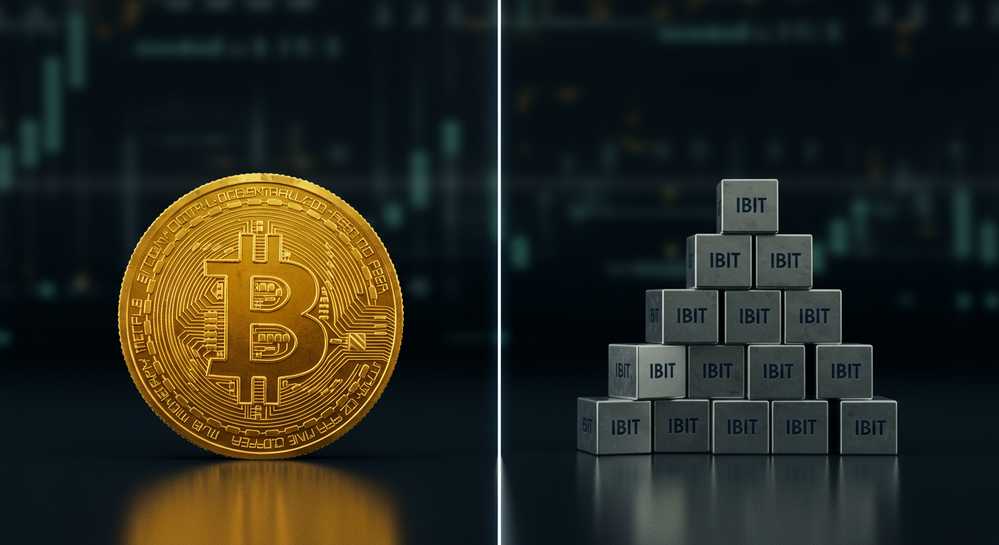Understanding the relationship between Bitcoin and its ETF counterparts is crucial for modern investors. A common question is how many shares of ibit equal one bitcoin. This article provides a direct explanation, detailing the calculation method and exploring the core differences between investing in the iShares Bitcoin Trust (IBIT) and holding the underlying digital asset, empowering you to make an informed decision.
Contents
Why the IBIT to Bitcoin ratio is not fixed
The question of how many shares of IBIT equal one Bitcoin has no permanent answer because the ratio is constantly changing. IBIT is an Exchange Traded Fund (ETF) that trades on the stock market, while Bitcoin trades on separate crypto exchanges. Although the fund’s purpose is to mirror Bitcoin’s price, its shares are subject to different market forces. This creates a dynamic relationship, not a fixed conversion rate.
Three core elements explain why this ratio fluctuates:
- Net Asset Value (NAV): This represents the underlying value of Bitcoin that each IBIT share holds. It is the theoretical value based on the fund’s total Bitcoin assets divided by the number of shares.
- Market Price: This is the actual price you pay for an IBIT share on an exchange. It is driven by real-time supply and demand, which can cause the share to trade at a slight premium or discount to its NAV.
- Bitcoin Price Action: As the primary asset, Bitcoin’s price movement is the main driver of the fund’s NAV. However, the ETF’s market price may react with a slight delay or variation to these changes.
Therefore, any calculation showing how many shares of IBIT equal one Bitcoin is merely a snapshot reflecting the prices of both assets at a specific moment.

Calculating how many shares of IBIT equal one Bitcoin is a simple comparison of their live market prices. The process requires just two pieces of real-time data: the current price of one Bitcoin (BTC) and the current market price of a single IBIT share. The share price itself is influenced by its own trading dynamics on the stock exchange, including its average daily volume. This calculation gives you a precise snapshot of their value relationship at any moment.
The calculation formula
To determine the exact ratio, use the following straightforward equation:
Number of IBIT Shares for 1 BTC = Current Price of 1 Bitcoin / Current Price of 1 IBIT Share
For example, lets use a hypothetical scenario for clarity. Assume the following prices:
- The price of 1 Bitcoin is $70,000.
- The price of 1 IBIT share is $40.
Applying the formula: $70,000 divided by $40 equals 1,750. In this case, it would take 1,750 shares of IBIT to equal the value of one Bitcoin. Because both prices are volatile, you must always use the latest data for an accurate result.

While an IBIT share is designed to track the price of Bitcoin, owning shares is fundamentally different from holding the actual cryptocurrency. The answer to how many shares of IBIT equal one Bitcoin only reflects market value, not the nature of the asset. Understanding these distinctions is crucial for aligning your investment strategy with your personal goals, whether they are focused on financial exposure or decentralization.
Key distinctions for investors
Here is a breakdown of the core differences between these two approaches:
- Ownership and Custody: When you buy IBIT, you own shares in a trust that holds Bitcoin; you do not own the Bitcoin directly. Custody is managed by a third party. Holding actual Bitcoin means you possess the private keys and have full control over your assets.
- Trading Hours and Accessibility: IBIT shares are traded on traditional stock exchanges like Nasdaq, which operate during specific market hours. Bitcoin, on the other hand, trades 24/7 on global cryptocurrency exchanges.
- Associated Fees: IBIT comes with an annual management fee. Holding Bitcoin directly involves network transaction fees when you move it and a potential undefined when buying, but has no ongoing management costs.
- Regulatory Framework: IBIT is a regulated financial product, providing a familiar structure and layer of investor protection. Bitcoin itself operates in a more nascent and evolving regulatory landscape globally.
Is investing in IBIT a good substitute for Bitcoin

Deciding between IBIT and direct Bitcoin ownership depends on your investment profile, technical comfort, and philosophy. The choice goes beyond simply knowing how many shares of IBIT equal one Bitcoin. Neither option is universally better; they serve different purposes for different investors and their unique goals.
Which option is right for you
- Choose IBIT if: You want exposure to Bitcoin’s price without the technical complexities of self-custody. You prefer investing through a traditional brokerage account, possibly within a tax-advantaged plan, and value the regulatory oversight of a familiar financial product.
- Choose direct Bitcoin if: You believe in the core principles of decentralization, self-sovereignty, and censorship resistance. You want the ability to use Bitcoin as a peer-to-peer currency and are comfortable managing your own private keys and security.
Ultimately, IBIT provides a convenient proxy for Bitcoin’s price performance, while direct ownership provides access to the unique properties of the Bitcoin network itself. Your choice reflects whether you see Bitcoin as a purely financial asset or as a revolutionary technology.
The number of IBIT shares for one Bitcoin is a fluid metric dependent on their respective market prices. While IBIT offers simplified and regulated access to Bitcoin’s price movements, it’s fundamentally different from direct ownership in terms of custody, accessibility, and philosophy. Understanding this distinction is key to aligning your strategy with your financial goals. For more insights on advanced crypto investment tools, explore Best Trading Bots Crypto.
